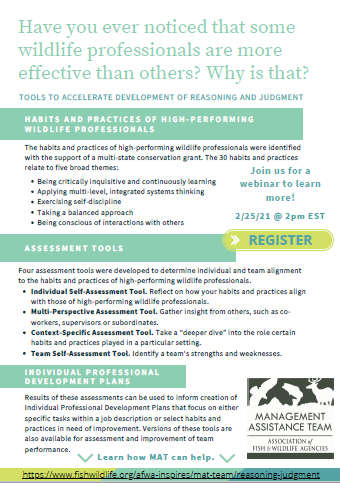What is the basis of sound reasoning and good judgment for wildlife professionals? How can development of these skills be accelerated? A team of collaborators from Cornell University, Michigan State University, Wildlife Management Institute, Florida Fish and Wildlife Conservation Commission, Michigan Department of Natural Resources, and New York Department of Environmental Conservation set out to answer these two fundamental questions as part of a 2019 Multi-State Conservation Grant. The group began this effort by identifying a broad-based sample of professionals who are recognized by their peers as “high-performing” and identifying their habits and practices related to sound reasoning and good judgment. The team then created and tested several diagnostic tools that can be used to identify habits and practices needing improvement, as well as a tool for creating an individual professional development plan.
ready to learn more?
- Check out the one-pager to the right for a brief overview of these resources.
- View our webinar below for an overview of the tools and how to use them to improve staff performance at the individual and team level.
- Read the User's Guide below for all the details.
- Contact us using the form below for help!
Guide Book (Background & Instructions)
Accelerating Development of Reasoning and Judgment: A User’s Guide for Fish and Wildlife Conservation Professionals
Habits and Practices
Checklist of Habits and Practices of High-Performing Fish and Wildlife Professionals
Interactive Quick Reference of the Habits and Practices
Resources for Further Reading about Habits and Practices Identified in the Foundational Study for this Professional Development-support Project
Assessment Tools
Individual Self-Assessment Tool - Fillable PDF
Individual Self-Assessment Tool (ISAT) - Google Form*
Printable ISAT - Adobe PDF, printable
Multi-Perspective Assessment Tool (MPAT) - printable
Multi-Perspective Assessment Tool (MPAT) - Excel sheet
Multi-Perspective Assessment Tool (MPAT) Aggregate Data - Excel sheet
Context-Specific Assessment Tool (CSAT) - Microsoft Word document
Context-Specific Assessment Tool (CSAT) - Adobe PDF
Team Self-Assessment Tool (TSAT) - Adobe PDF
Team Self-Assessment Tool (TSAT) - Excel sheet
Team Self-Assessment Tool (TSAT) Aggregate Data - Excel sheet
Individual Professional Development Plans (IPDPs)
IPDP Task-Oriented-Approach Form - Microsoft Word document
IPDP Task-Oriented-Approach Form - Adobe PDF
IPDP Habit-Oriented-Approach Form - Microsoft Word document
IPDP Habit-Oriented-Approach Form - Adobe PDF
*NOTE: If you complete the ISAT via Google Forms, you will receive an automatic email with your responses. Click “view this email in a browser” to see your full list of responses.
Learn More
Daniel J Decker, W. F. Siemer, E. F. Pomeranz, A. B. Forstchen, M. V. Schiavone, M. S. Baumer, C. A. Smith, S. J. Riley, and P. E. Lederle. 2019. Identifying habits and practices of effective fish and wildlife management professionals. Center for Conservation Social Sciences Publ. Series 19-3. Dept. of Nat. Resources., Coll. Agric. and Life Sci., Cornell Univ., Ithaca, NY. 37pp.
